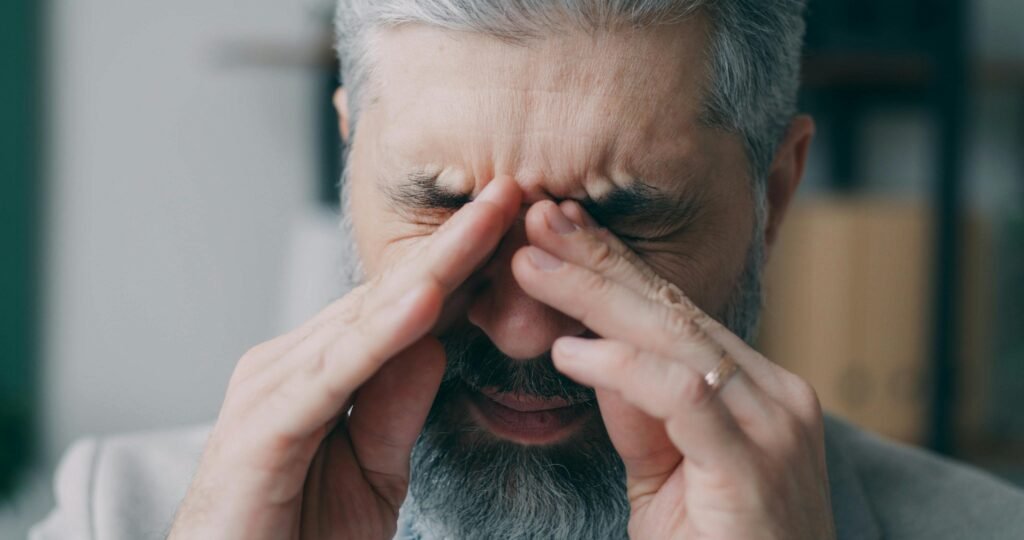
Introduction to Anxiety’s Physical Impact
Anxiety is commonly thought of as a mental struggle, filled with worries and fears that can be overwhelming.
However, what many people don’t realize is that anxiety doesn’t just affect the mind; it can have a wide array of physical impacts on the body as well.
These physical signs are often overlooked or misinterpreted, leading to confusion and even more stress.
When anxiety takes hold, the body’s response can be quite surprising.
For example, you might suddenly experience digestive issues that seem to come out of nowhere. Nausea, an upset stomach, and even conditions like Irritable Bowel Syndrome can be triggered or worsened by anxiety.
These issues can feel purely physical, making it hard to connect them back to your mental state.
Muscle tension is another frequent but less recognized symptom.
Anxiety can cause your muscles to tighten up, resulting in pain or discomfort that you might attribute to other causes.
Chronic back pain or persistent headaches could be your body’s way of signaling that something is off emotionally.
Your skin can also give you clues about your mental health.
Anxiety can lead to stress induced rashes or excessive sweating, which can be both uncomfortable and embarrassing.
These symptoms might prompt you to visit a dermatologist when the root cause is actually psychological.
Breathing is another area that anxiety affects.
You might find yourself short of breath or even hyperventilating during moments of intense anxiety.
These symptoms can be alarming and are often mistaken for more severe medical conditions.
Heart-related symptoms are also common.
Palpitations or chest pain can mimic the signs of a heart attack, causing unnecessary panic.
Recognizing these as potential signs of anxiety can help you manage your responses more effectively.
Finally, anxiety can wreak havoc on your sleep. Difficulty falling asleep, restless nights, and waking up frequently are all signs that your mental health might need attention.
Understanding these various physical manifestations can empower you to take steps toward better managing your anxiety.
By recognizing the connection between your mind and body, you can seek the appropriate help and improve your overall well being.
Digestive Problems

Digestive problems are among the most telling signs of anxiety, often taking people by surprise.
The brain and the gut are closely connected through a complex system of nerves and biochemical signals, often referred to as the gut brain axis.
When you’re anxious, your body releases stress hormones like cortisol, which can significantly impact your digestive system.
One common issue is nausea, which can appear suddenly and without any apparent cause.
You might also experience an upset stomach, cramps, or even vomiting during stressful periods.
These symptoms are not just uncomfortable; they can also be alarming, especially when there’s no obvious physical reason for them.
Another condition that can be influenced by anxiety is Irritable Bowel Syndrome (IBS).
For those who suffer from IBS, anxiety can intensify symptoms like abdominal pain, bloating, and irregular bowel movements.
It’s a two way street: just as anxiety can exacerbate IBS, the discomfort from IBS can also increase feelings of anxiety, creating a challenging cycle to break.
Some people find that their appetite changes when they’re anxious.
You might lose your appetite entirely or, conversely, find yourself eating more than usual.
Both extremes can lead to further digestive discomfort, such as indigestion or acid reflux.
The stress of worrying about these symptoms can, in turn, make them worse.
It’s also worth noting that anxiety can speed up or slow down your digestive process.
Some people might experience diarrhea, while others might suffer from constipation.
These changes in bowel habits are often perplexing and can make it difficult to pinpoint anxiety as the root cause.
Recognizing these digestive issues as possible signs of anxiety can be a game-changer.
Instead of endlessly searching for a physical ailment, understanding the link between your mental state and digestive health can help you find more effective ways to manage your symptoms.
Techniques such as mindfulness, relaxation exercises, and even therapy can make a significant difference in both your mental and physical well-being.
Muscle Tension and Pain
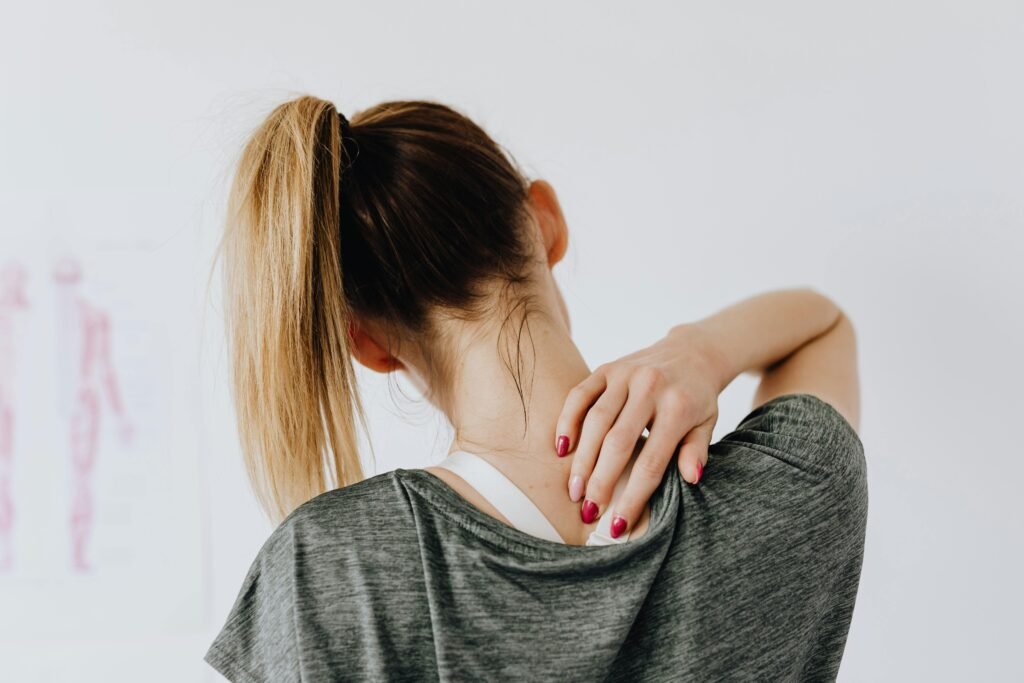
Muscle tension and pain are often overlooked as signs of anxiety.
When you’re anxious, your body goes into a “fight or flight” mode, releasing stress hormones like adrenaline and cortisol.
These hormones can cause your muscles to contract and tighten.
Over time, this constant state of tension can lead to chronic discomfort or pain, particularly in areas such as the neck, shoulders, and back.
You might also find that you clench your jaw or grind your teeth, especially during stressful periods.
This can result in headaches or pain in the jaw and face.
Many people visit their dentist for these issues without realizing that anxiety might be the underlying cause.
Even tension in your hands and feet can be a sign.
Some people experience cramps or a feeling of tightness in these extremities, which can be both confusing and unsettling.
Another aspect to consider is that muscle tension can limit your range of motion, making it difficult to perform everyday activities.
You might feel stiff or find it hard to relax your muscles, which only adds to your overall stress levels.
Sometimes, muscle tension is accompanied by other symptoms like fatigue and irritability.
The physical strain of constant muscle tension can wear you down, making you feel tired and emotionally drained.
This can create a cycle where your physical symptoms feed your anxiety, and your anxiety worsens your physical symptoms.
Recognizing that muscle tension and pain can be related to anxiety is crucial for finding effective relief.
Techniques like stretching, massage, and gentle exercise can help release some of the tension.
Mindfulness and relaxation exercises can also be beneficial, allowing you to focus on releasing the tightness in your muscles.
Understanding this connection can empower you to address both the physical and emotional aspects of your anxiety, leading to a more comprehensive approach to managing your symptoms.
Skin Reactions
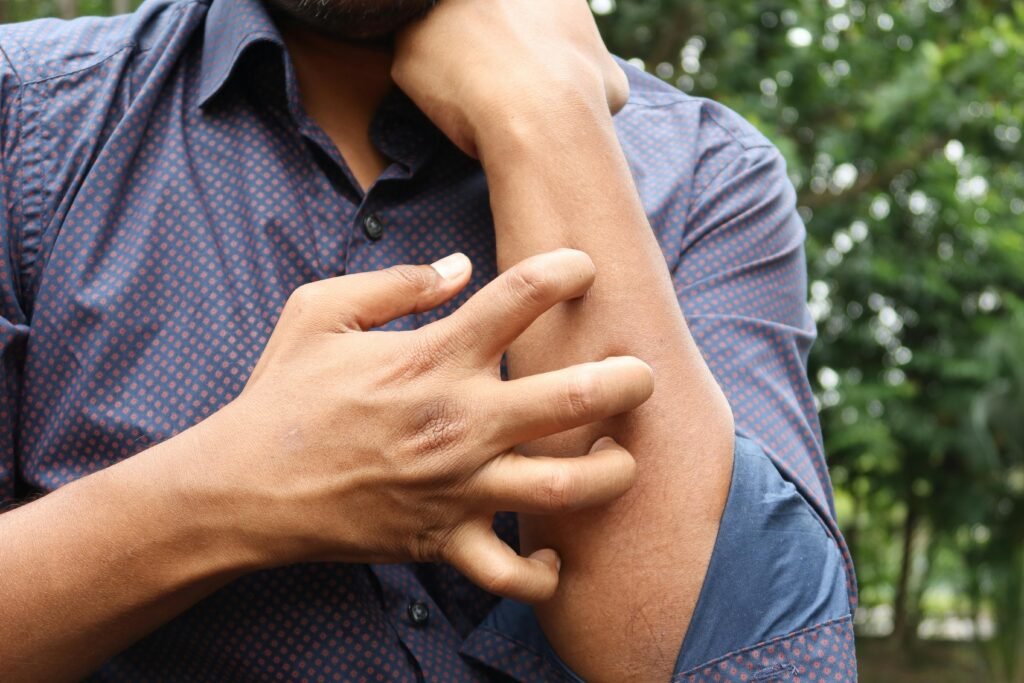
When anxiety hits, your skin can show signs in unexpected ways.
You might notice stress induced rashes or hives popping up, which can be both itchy and uncomfortable.
These skin reactions often appear without any clear reason, making them even more puzzling.
Another common issue is excessive sweating.
This isn’t just about feeling a little warm; it can mean drenching sweats that make you feel self conscious and add to your stress.
For some people, anxiety can also lead to flare ups of existing skin conditions like eczema or psoriasis.
The stress of worrying about these skin problems can, in turn, make them worse, creating a tough cycle to break.
You might spend time applying creams or seeking dermatological advice when the root cause is actually your anxiety.
It’s also not uncommon to experience acne breakouts when you’re stressed.
The body releases more cortisol during anxious times, which can increase oil production in the skin.
This excess oil can clog pores, leading to breakouts that are hard to manage.
If you find that your skin tends to act up during stressful periods, anxiety might be the underlying issue.
Some individuals might experience a tingling or burning sensation on their skin without any visible cause.
This can be alarming and lead you to think something is seriously wrong.
Often, this sensation is just another way your body is reacting to anxiety.
Recognizing that these skin issues might be linked to your mental state can be eye opening.
Instead of solely focusing on treating the symptoms with topical solutions, it might be worth considering stress reducing techniques.
Practices like mindfulness, meditation, and even cognitive behavioral therapy can help manage your anxiety, which may, in turn, improve your skin health.
Paying attention to how your skin reacts during times of stress can offer valuable clues about your overall mental health.
Understanding this connection can help you take steps to manage both your anxiety and its physical manifestations more effectively.
Breathing Difficulties
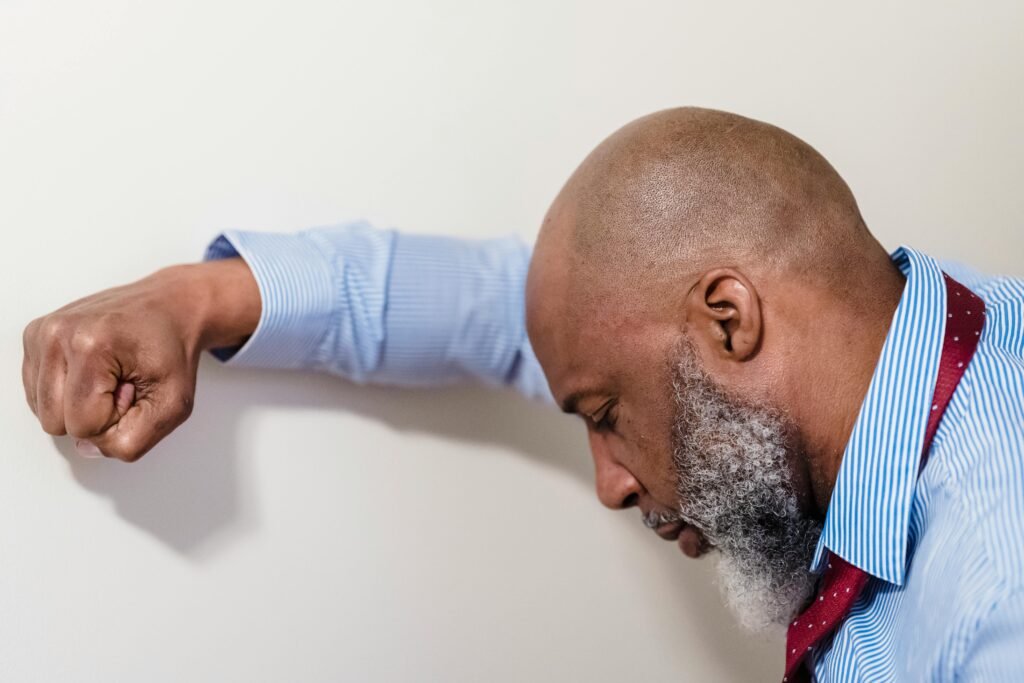
Anxiety can significantly impact your breathing patterns, often causing shortness of breath or hyperventilation.
This isn’t just a minor inconvenience; it can be genuinely alarming.
You might feel like you can’t catch your breath, even if you haven’t been physically active.
This can make you think there’s something seriously wrong with your lungs or heart, adding to your overall stress.
During a moment of intense anxiety, your body activates its “fight or flight” response, preparing you to either confront a threat or run away from it.
This response includes rapid, shallow breathing to get more oxygen to your muscles quickly.
However, when there’s no physical danger, this change in breathing can leave you feeling lightheaded, dizzy, or even more anxious.
Hyperventilation is another common issue.
When you breathe too rapidly, you expel more carbon dioxide than your body produces, leading to a decrease in the carbon dioxide levels in your blood.
This imbalance can cause a range of symptoms, including tingling in your fingers and toes, a sense of unreality, or even chest pain.
These sensations can be frightening and might lead you to seek medical help for what you believe to be a serious condition.
Some people might experience what’s known as “air hunger,” a feeling that you just can’t get enough air into your lungs.
This can be particularly distressing and may lead you to take rapid, shallow breaths, which can make the sensation even worse.
It’s also possible to have a lump in the throat sensation, often referred to as “globus hystericus.”
This can make swallowing difficult and add to the feeling that something is obstructing your airway, even though it’s just another manifestation of anxiety.
Understanding that these breathing difficulties are linked to anxiety can help you manage them more effectively.
Techniques such as controlled breathing exercises, mindfulness, and relaxation strategies can help you regain control over your breathing and reduce the distress these symptoms cause.
Recognizing these symptoms as part of your body’s reaction to anxiety can help you stay calm and avoid unnecessary panic.
Heart Related Symptoms
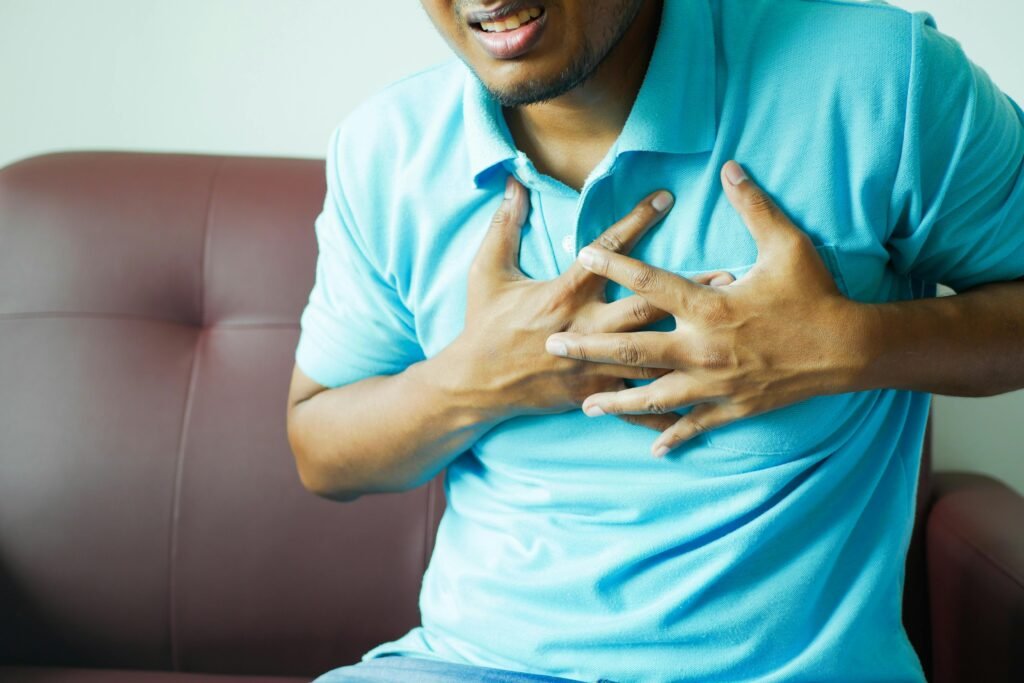
Heart related symptoms can be some of the most distressing physical signs of anxiety, often leading people to fear they’re experiencing a serious heart condition.
When you’re anxious, your body releases stress hormones like adrenaline, which can speed up your heart rate and cause palpitations.
These palpitations can feel like your heart is pounding, fluttering, or skipping beats, creating a sense of alarm.
Chest pain is another common symptom.
Anxiety can cause your chest muscles to tighten, leading to sharp or aching pain that might make you think you’re having a heart attack.
This chest discomfort is often accompanied by other anxiety related symptoms, such as shortness of breath or dizziness, further increasing your worry.
Some people might experience a phenomenon known as “heart awareness,” where you become hyper aware of your heartbeat.
This can make you feel like your heart is racing even when it’s beating normally, adding to your anxiety.
In addition to palpitations and chest pain, anxiety can also cause a condition known as “non cardiac chest pain.”
This type of pain is not related to heart disease but is still very real and can be just as painful.
It’s often triggered by muscle tension, hyperventilation, or acid reflux, all of which can be exacerbated by anxiety.
You might also notice that your symptoms worsen during specific times, such as when you’re facing a stressful situation or even when you’re trying to relax after a busy day.
This can create a cycle where the fear of having a heart problem increases your anxiety, which in turn worsens the physical symptoms.
Understanding that these heart related symptoms can be linked to anxiety helps in managing them more effectively.
Practices like deep breathing exercises, mindfulness, and regular physical activity can help reduce these symptoms.
If you’re frequently experiencing these signs, it’s essential to consult with a healthcare professional to rule out any actual heart conditions and to develop a comprehensive plan to manage your anxiety.
Sleep Disturbances
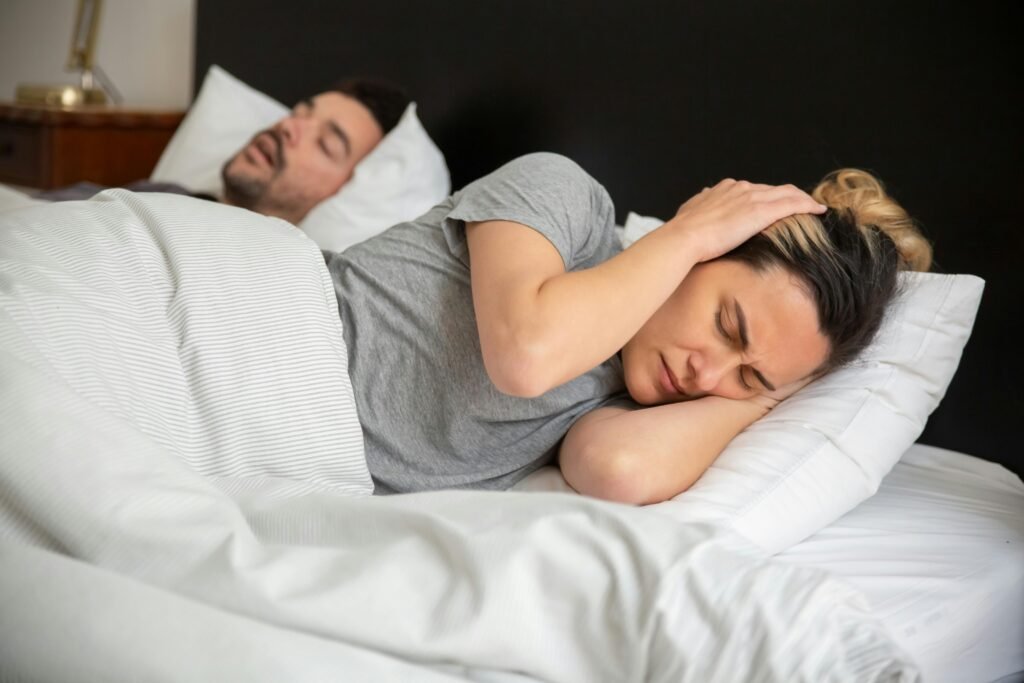
Anxiety is notorious for disrupting sleep patterns, leaving you feeling drained and unrefreshed.
When your mind is racing with worries, falling asleep can feel like an impossible task.
You may find yourself tossing and turning, unable to settle into a restful state.
Even if you do manage to fall asleep, anxiety can prevent you from staying asleep, leading to frequent awakenings throughout the night.
This broken sleep means that you’re not getting the deep, restorative rest your body needs to function properly.
Another common issue is waking up too early and being unable to get back to sleep.
Your mind may start to race the moment you open your eyes, filling with concerns about the day ahead.
This can leave you staring at the ceiling, unable to calm your thoughts enough to drift back off.
Anxiety can also manifest in the form of nightmares or vivid dreams.
These unsettling experiences can jolt you awake, leaving you feeling anxious and on edge.
The emotional toll of these disturbing dreams can linger, making it hard to relax and fall back asleep.
Some people may experience a condition known as “sleep anxiety,” where the fear of not being able to sleep actually keeps them awake.
This can create a vicious cycle: the more you worry about not sleeping, the harder it becomes to actually do so.
Over time, this can lead to a sense of dread when it’s time to go to bed, making the problem even worse.
It’s also worth noting that poor sleep can amplify other physical symptoms of anxiety, such as muscle tension and digestive issues.
When you’re not well rested, your body’s ability to cope with stress diminishes, creating a feedback loop that can make your anxiety feel even more overwhelming.
Understanding that anxiety is at the root of your sleep issues can help you take steps to address the problem.
Simple techniques like establishing a calming bedtime routine, practicing mindfulness, and avoiding stimulants before bed can make a significant difference.
Conclusion and When to Seek Help

Identifying the physical symptoms of anxiety is crucial for effective management.
When these symptoms go unnoticed or are misinterpreted, it can lead to additional stress and confusion.
If you notice signs like digestive issues, muscle tension, skin reactions, breathing difficulties, heart related symptoms, or sleep disturbances, it may be time to consider that anxiety could be the root cause.
Consulting healthcare professionals can provide valuable insights and accurate diagnosis.
They can help distinguish between symptoms caused by anxiety and those arising from other medical conditions.
This distinction is vital because it guides appropriate treatment, ensuring you receive the care you need.
While many people experience mild impairment from anxiety, some suffer from moderate or serious impairments. Professional guidance can be especially beneficial for these individuals.
A significant percentage of adults with anxiety disorders face these levels of impairment.
Interventions such as therapy, medication, lifestyle changes, and stress management techniques can make a significant difference in your well being.
Remember, you don’t have to navigate this journey alone.
Support from healthcare providers, counselors, and loved ones can make managing anxiety more manageable.
Understanding the connection between your mental state and physical health can empower you to take proactive steps towards a healthier, more balanced life.
By recognizing and addressing these physical manifestations of anxiety, you can work towards improving your overall quality of life.
Seek help, stay informed, and take charge of your mental and physical health.
